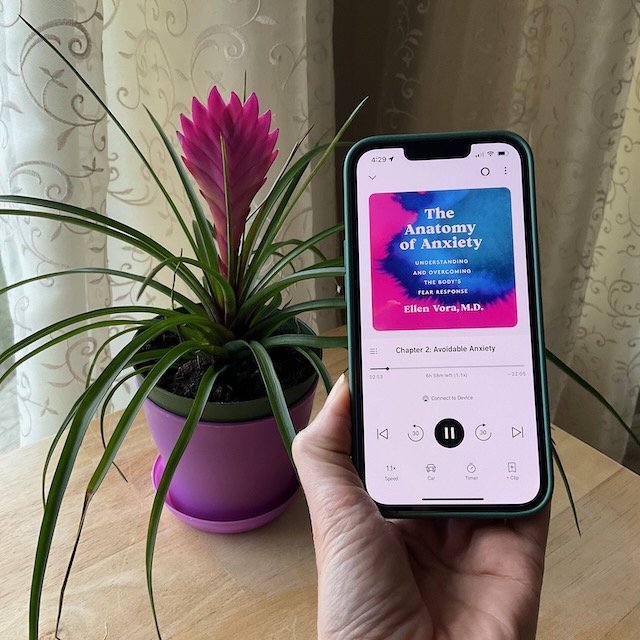The Anatomy of Anxiety (by Ellen Vora)
I learned about this book, The Anatomy of Anxiety, by Ellen Vora through the social media app Litsy. Another avid reader had posted great comments about this book, which immediately raised my curiosity, so I purchased the audiobook version from Audible.
Dr. Vora is a holistic psychiatrist who studied under Dr. Andrew Weil. Small world! I had just read two of Dr. Weil’s audiobooks: Healthy Sleep and Breathing. (Each title is linked to my previous blog posts for your convenience.) I immediately liked Dr. Vora as she expresses compassion towards all people. She makes her point clear that she isn’t advocating for readers to follow her advice exactly. She offers options and recommendations based on her extensive training and clinical experience. She acknowledges that everyone is different and all of her suggestions will not be right for everyone. I admire that Dr. Vora isn’t about diagnoses or labels. She works with her clients’ individual concerns and goals for treatment. She identifies that meds are helpful for some people, but not all. Her focus is to search for holistic approaches before writing prescriptions.
As for the structure of this book, Dr. Vora first gives readers permission to use the book as needed. She encourages skipping around and reading chapters that are of most interest. I usually don’t take authors up on this and read a book straight through; however, I did skip the chapter on pregnancy. I don’t have kids nor intend to, so I moved passed this subject.
Dr. Vora explains anxiety in two ways: false anxiety and real anxiety. Body-based anxiety is false. There are things in our lives that cause anxiety, such as our diet. She thoroughly explains how our digestive health and diet influence physiological anxiety. She also covers the importance of sleep hygiene and the damaging affects of social media and news media. Personally, the digestive health and sleep hygiene chapters contained the most helpful information. I don’t spend a ton of time on social media, especially during the work week, I just don’t have time. I’m terrible at staying current with the news. During the COVID-19 pandemic, I watched too much news had to seriously back off. Now, I probably don’t stay current enough.
Regarding real anxiety, Dr. Vora offers a lot of suggestions I’m familiar with, such as meditation and breathing exercises. She talked a lot about the clinical benefits of psilocybin and LSD. She explained the treatment modality of Cognitive-Behavioral Therapy (CBT) and identified a down-side I had not previously considered.
Dr. Vora stated she’s not a huge fan of taking supplements to treat anxiety as she encourages people manage the physiological causes of anxiety with diet; however, she does recommend a few. Some she mentioned that I’m familiar with are Magnesium Citrate, CBD, and Awagashanda. I already take CBD daily and have begun taking Magnesium Citrate since listening to Dr. Vora’s advice. She also emphasizes the importance of connecting with others we love and want to spend time with.
This is an excellent book for people new to learning about anxiety and holistic coping mechanisms. If you’re like me and have been working to make self-care a priority for several years, this book will validate what you’ve already learned. It will also teach you a few new things.
As a side note, the picture above was taken with one of our recent purchases at Wilson’s Nurseries in Frankfort, Kentucky. My husband and I recently shopped their huge conservatory for unique houseplants.
As a participant in the Amazon Associates Program, I earn from qualifying purchases linked back to Amazon. Every penny earned allows me to blog about books and keeps this site running.


